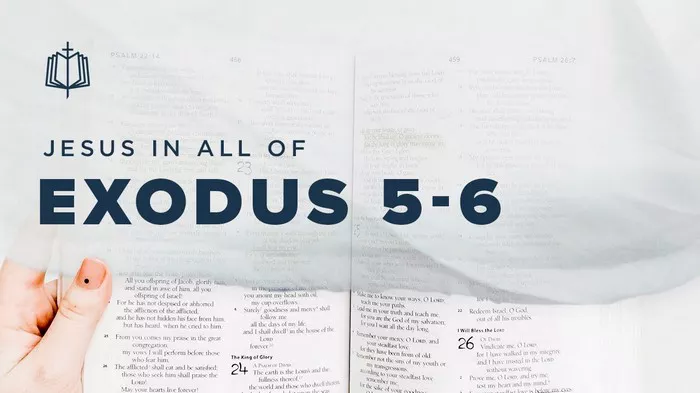Read the Daily Bible Verse – Exodus 5:6 To Strengthen Your Spiritual Journey.
Exodus 5:6 continues the dramatic narrative of Moses and Aaron’s confrontation with Pharaoh as they seek to fulfill God’s command to liberate the Israelites. In this passage, Pharaoh escalates his oppressive measures in response to their appeal, revealing his hardened heart and resistance to divine authority.
This article will explore Exodus 5:6, examining its historical and theological context, its meaning, and its application in life. Comparisons with other biblical texts and its modern-day relevance will also be considered.
The Context on Exodus 5:6 KJV
The Verse in Question
Exodus 5:6 states:
“And Pharaoh commanded the same day the taskmasters of the people, and their officers, saying,”
This verse marks the beginning of Pharaoh’s retaliation against the Israelites following Moses and Aaron’s request to let them go. Pharaoh’s command is directed toward the taskmasters and officers responsible for supervising the Israelites’ labor.
Historical Background
The Israelites were enslaved in Egypt under harsh conditions, laboring to build cities and sustain the Egyptian economy. Moses and Aaron, sent by God, had approached Pharaoh with the divine message: “Let my people go, that they may hold a feast unto me in the wilderness” (Exodus 5:1).
Pharaoh’s refusal to acknowledge Yahweh’s authority and his perception of the Israelites as mere laborers led to his oppressive response, intensifying their suffering.
The Meaning of Exodus 5:6
Pharaoh’s Response
Pharaoh’s immediate reaction to Moses and Aaron’s request was not only a rejection of their plea but also a punitive action against the Israelites. His command to the taskmasters underscores his intent to reassert his authority and suppress any hope of liberation.
A Symbol of Resistance
This verse reveals Pharaoh’s hardened heart and his defiance of God’s authority. Rather than considering the Israelites’ request as a legitimate act of worship, Pharaoh perceives it as an act of rebellion. His response sets the stage for the unfolding conflict between human authority and divine sovereignty.
Exodus 5:6 Application in Life
Recognizing the Cost of Obedience
Moses and Aaron’s obedience to God’s command came at a cost, as their actions led to an immediate increase in the Israelites’ suffering. This teaches believers that following God’s will may sometimes result in opposition or hardship, but faithfulness to His purpose remains paramount.
Understanding Human Resistance to God
Pharaoh’s resistance mirrors the broader human tendency to reject divine authority. This passage challenges individuals to examine their own hearts and consider whether they are yielding to God’s will or resisting His plans.
Trusting in God’s Sovereignty
Despite Pharaoh’s harsh response, the narrative of Exodus ultimately demonstrates God’s power to deliver His people. Believers are reminded to trust in God’s sovereignty, even when circumstances seem to worsen.
Comparison with Other Biblical Texts
Isaiah 45:9: Resisting the Potter
Isaiah 45:9 warns, “Woe unto him that striveth with his Maker!” This verse parallels Pharaoh’s resistance, highlighting the futility of opposing God’s will. It underscores the danger of hardening one’s heart against divine authority.
Acts 5:38–39: God’s Plans Cannot Be Overthrown
In Acts 5:38–39, Gamaliel advises the council, saying, “If this counsel or this work be of men, it will come to nought: But if it be of God, ye cannot overthrow it.” Pharaoh’s opposition to God’s plan in Exodus 5:6 ultimately proves futile, as God’s purpose prevails.
Romans 8:31: God’s People Are Not Alone
Romans 8:31 declares, “If God be for us, who can be against us?” This verse reassures believers that God’s presence and power are greater than any opposition they may face, echoing the ultimate triumph seen in the Exodus story.
Modern-Day Relevance
The Nature of Oppression
Pharaoh’s actions in Exodus 5:6 reflect the dynamics of oppression, where those in power seek to maintain control by dehumanizing and exploiting others. This passage challenges believers to stand against injustice and advocate for the oppressed in their own contexts.
The Cost of Advocacy
Moses and Aaron’s experience highlights the challenges of advocating for justice and freedom. Christians today may face similar resistance when standing for truth and righteousness, but they are called to persevere in their mission.
Faith Amidst Adversity
The escalation of hardship following Moses and Aaron’s obedience serves as a reminder that faithfulness to God’s calling often involves trials. Believers are encouraged to trust in God’s ultimate plan and His ability to bring deliverance.
Conclusion
Exodus 5:6 is a pivotal verse that sets the tone for the conflict between Pharaoh and the God of Israel. It reveals Pharaoh’s hardened heart, his determination to oppress the Israelites, and his resistance to divine authority.
For believers today, this passage serves as a powerful reminder of the cost of obedience, the reality of human opposition to God, and the assurance of His ultimate sovereignty. It challenges Christians to trust in God’s plans, advocate for justice, and remain steadfast in their faith, even when faced with adversity.
As the story of Exodus unfolds, it becomes clear that no human power can thwart God’s purposes. In the face of opposition, may we find courage and hope in the knowledge that God’s plans for deliverance and redemption will always prevail.
Exodus 5:6 Commentary
Pharaoh’s Control
Pharaoh’s command to the taskmasters reflects his desire to tighten his grip on the Israelites and prevent any notion of liberation. His response is a calculated effort to discourage both the Israelites and their leaders from pursuing freedom.
Theological Insights
This verse highlights the broader spiritual battle between human defiance and divine authority. Pharaoh’s actions symbolize humanity’s resistance to God’s will, while the unfolding narrative demonstrates God’s power to overcome all opposition.
You Might Be Interested In:
- Exodus 5:3 Meaning, Context & Commentary
- What Does Exodus 5:4 Mean?
- Exodus 5:5 Meaning, Context & Commentary

